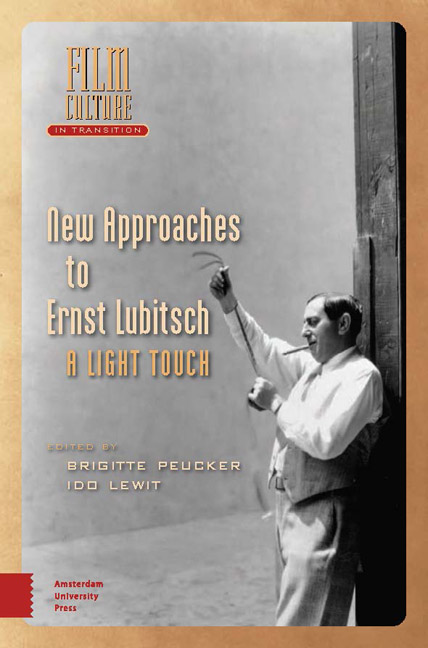9 - Regulating the Gaze and the Voice for a Cinema in Transition : The Merry Jail and So This Is Paris
Published online by Cambridge University Press: 16 April 2024
Summary
Abstract
This essay focuses on The Merry Jail (1917) and So This Is Paris (1926)—two Lubitsch films that are based on the same primary source. Their genealogical affinity and ensuing similarities are the basis for an investigation of the impact of the cinematic incorporation of objects and media on filmic style. The essay investigates the function of doors and letters in The Merry Jail and of windows and electronic telecommunication in So This Is Paris with respect to the properties and epistemological underpinnings of the cinematic medium in two momentous periods of film history.
Keywords: objects, cinema and technology, cinematic gaze, the emergence of film sound
Made in different times, in different cultural contexts, and following different cinematic traditions, Ernst Lubitsch's German and American films form two distinct oeuvres. The specific characteristics of each are easy to point to: the German period (1913–1923) features Jewish milieu comedies of social integration and historical dramas boasting mass choreographies, whereas the American (1923–1947) is characterized by sophisticated matrimonial comedies and brisk musicals. While the two oeuvres diverge in almost every conceivable sense, however, two films from both sides of the divide—The Merry Jail (Das fidele Gefangnis, Lubitsch, 1917) and So This Is Paris (Lubitsch, 1926)—present intriguing affinities. The resemblance is hardly coincidental: not only are both scripted by Hanns Kraly (like most of Lubitsch's pre-1930 work), but the two scripts are genealogically linked: The Merry Jail takes essential narrative cues from Johann Strauss Jr.'s 1874 operetta The Bat (Die Fledermaus), whose libretto is based, in part, on Ludovic Halevy and Henri Melihac's 1872 play Le Reveillon, of which So This Is Paris is a free adaptation.
Although So This Is Paris restages some scenes from The Merry Jail, the two narratives generally reveal few similarities and one can hardly treat the latter film as a remake of the former. That said, the two films present thematic and stylistic similarities—and also, as we shall see, structural oppositions—to an extent that begs comparative scrutiny. Particularly, their intermedial integration of such objects and media as doors, windows, letters, and the radio appears instructive with reference to changes in the director's cinematic vision with respect to the two productions.
- Type
- Chapter
- Information
- New Approaches to Ernst LubitschA Light Touch, pp. 179 - 194Publisher: Amsterdam University PressPrint publication year: 2024



